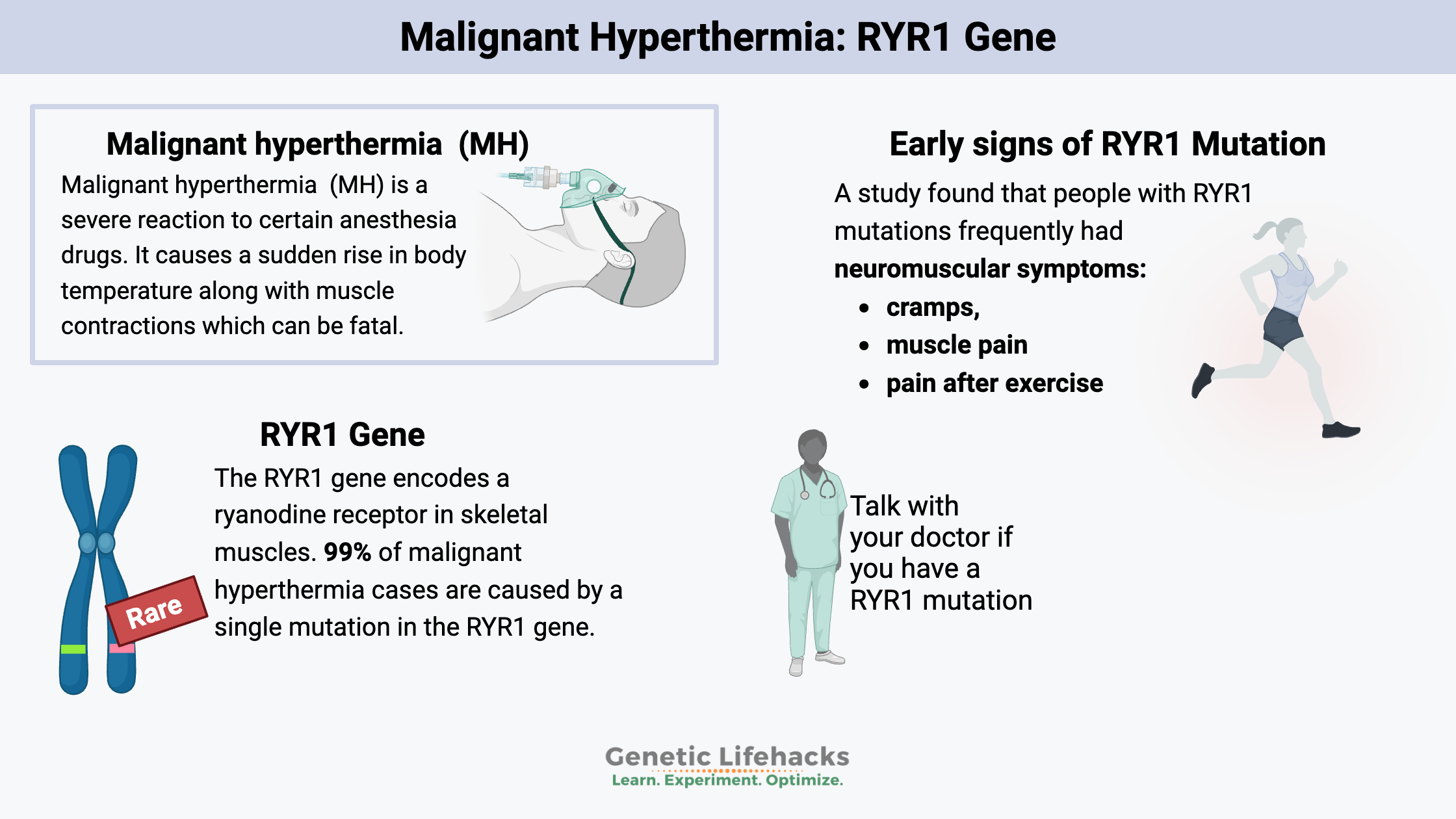Key takeaways:
~ People with mutations in the RYR1 gene may be susceptible to malignant hyperthermia when exposed to inhaled anesthesia.
~ Malignant hyperthermia is a severe reaction to inhaled anesthesia, which can be fatal if not promptly recognized and treated.
What is Malignant Hyperthermia?
Malignant hyperthermia (MH) is caused by a sudden rise in body temperature along with muscle contractions due to a severe reaction to certain anesthesia drugs.
It is estimated that 1 in 400 to 1 in 2,000 people carry the genetic mutations associated with malignant hyperthermia, potentially putting them at risk of dying from inhaled anesthesia. Keep in mind, however, that only about 2% of the population undergoes anesthesia in any given year. The estimated number of malignant hyperthermia episodes per year is between 1 in 5,000 and 1 in 50,000.[ref][ref][ref]
Inhaled anesthesia, with the exception of nitrous oxide (laughing gas), can cause malignant hyperthermia in people who are genetically susceptible. Additionally, succinylcholine, a muscle relaxant, can be a trigger. The dose and duration of anesthesia used are a factor in whether someone is likely to develop MH.[ref]
Note: People with certain mutations in the BCHe gene can also have genetic problems with succinylcholine through a different pathway.
The excessive rise in body temperature accompanies an increase in heart rate, increased CO2 production, increased oxygen consumption, and muscle rigidity. This is due to an uncontrolled rise of calcium ions in the muscles. If not treated quickly, malignant hyperthermia is fatal.[ref]
Genetic mutations in RYR1:
The RYR1 gene encodes a ryanodine receptor in skeletal muscles. Mutations in the gene can cause a range of problems with calcium metabolism. In the muscle, calcium channel ions control the flow of calcium ions, which cause muscle contraction. [ref]
The primary form of malignant hyperthermia is caused by single mutations in the RYR1 gene for 99% of cases. It is considered autosomal dominant, meaning that only one copy of the mutation is needed to cause problems with inhaled anesthesia.
Side note: Ryanodine is a poisonous substance from a plant in South America. It is sometimes used as an insecticide, and is poisonous by blocking the ryanodine receptor.
Early signs of the mutation: cramps and muscle pain
A recent study looked at the medical records of people with malignant hyperthermia and known RYR1 gain-of-function mutations. They found that these patients also frequently had neuromuscular symptoms, such as cramps, muscle pain, and pain after exercise.[ref] (There are many other causes of cramps and muscle pain, of course. You can’t assume that you have a rare RYR1 mutation just from those symptoms.)
Exertional heat illness in people with RYR1 mutations
Heat stroke or exertional heat illness might overlap with malignant hyperthermia in some people with RYR1 mutations. While it seems like the two conditions should be connected, the research on the topic isn’t very robust due to the small study sizes. One study found that three out of 28 people with exertional heat illness had novel mutations in the RYR1 gene.[ref]
Other genes linked the malignant hyperthermia
Rare mutations in CACNA1S and STAC3 may also cause malignant hyperthermia.[ref]
Malignant Hyperthermia Genotype Report:
Please keep in mind that 23andMe and AncestryDNA data are not guaranteed to be clinically accurate and rare mutations could be a false positive. Take the information here as a ‘heads up’, and talk with your doctor before having inhaled anesthesia to see if further testing is warranted.
Access this content:
An active subscription is required to access this content.
Lifehacks
This is where I usually write about all the natural supplements and lifestyle modifications for mitigating a genetic variant… However, there aren’t any cures here.
Instead, I encourage you to talk to your doctor about any mutations associated with malignant hyperthermia. Your doctor can advise you on whether to do further genetic testing to confirm the results from a direct-to-consumer test, such as AncestryDNA.
I would also encourage you to check your BCHe gene variants to see if you have any interactions with succinylcholine, a muscle relaxant used in surgery.
Access this content:
An active subscription is required to access this content.
Related Articles:
Inclusion Body Myositis: Genomics and Solutions
Learn more about this progressive disease that causes muscle weakness due to inflammation in the muscle tissue.
Familial Mediterranean Fever: Mimics fibromyalgia, arthritis, inflammation
An auto-inflammatory disease caused by mutations in the MEFV gene.
Phase I and II Detoxification:
Your genetic variants in the CYP450 genes can impact reactions to medications.

